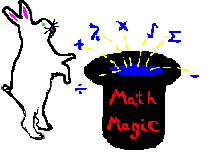

A. Many times instead of finding the next term in a sequence you are asked to find a specific term in a sequence. For problems like this use the following:
1. When asked this question, almost all the sequences will be adding a fixed number to each successive term. (See Finding The Next Term part C)
2. This problem I always approach from a logic standpoint.
3. Ask yourself, what should the first term be? (This is 'a'.) This is always equal to the fixed number that is being added.
4. Now, how can I change the number in step 3 (by adding or subtracting a number) to equal the first term? (This is 'b'.)
5. Now, make an expression for the nth term using the above information:
an + b
Ex [1] Find the 11th term of the sequence 4, 7, 10,...
a. Notice that 3 is being added to all numbers, so the first term should be 3, then 6, then 9, etc.
b. You need to add 1 to 3 to equal 4.
c. So the expression is 3n + 1.
d. The answer is 3(11) + 1 or 34.
Ex [2] Find the 8th term of the sequence -2, 0, 2,...
a. In this case 'a' is 2. So normally we would count: 2,4,6,etc. So the first term should be 2.
b. If we subtract 4 from 2 we get -2.
c. So the expression is 2n - 4.
d. The answer is 2(8) - 4 or 12.
Ex [3] Find the 40th term in the sequence 1, 7, 13,...
a. In this case 'a' is 6. So the first term should be 6.
b. If we subtract 5 from 6 we get 1.
c. So the expression is 6n - 5.
d. The answer is 6(40) - 5 or 235.
B. Sometimes the question is turned around and asks what term a certain number is in a sequence.
1. We can use the same logic as above to come up with an expression.
2. Find the expression for the nth term of the sequence (same as above).
3. Solve for n: an + b = x, where x is the given number.
Ex [4] 58 is what term in the sequence 1, 4, 7,...
a. Since we are adding by 3, 3 should be the first number.
b. If we subtract 2 from 3 we get 1.
c. So the expression is 3n - 2.
d. Solve: 3n - 2 = 58.
e. The answer is 20.
Ex [5] 105 is what term in the sequence 9, 13, 17,...
a. Since we are adding by 4, the first number should be 4.
b. If we add 5 to 4 we get 9.
c. So the expression is 4n + 5.
d. Solve: 4n + 5 = 105.
e. The answer is 25.